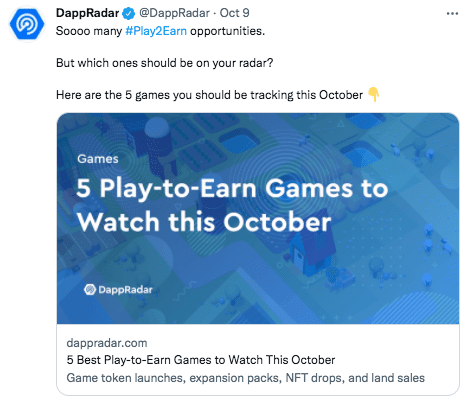October 11, 2021 / Unchained Daily / Laura Shin
Daily Bits ✍️✍️✍️
-
Polygon increased its minimum gas price by a factor of 30.
-
Binance.US promoted Brian Shroder to CEO.
-
Bitmain confirmed it’s halting shipments of mining equipment to China.
-
Bloomberg reports the White House is considering an executive order that would require federal agencies to study and recommend actions based on their oversight.
-
Referring to El Salvador’s adoption of Bitcoin as legal tender, Vitalik Buterin says he believes “making it mandatory for businesses to accept a specific cryptocurrency is contrary to the ideals of freedom that are supposed to be so important to the crypto space.”
-
Bored Ape Yacht Club is currently looking at Q1 2022 to launch an ERC 20 token.
-
An SEC filing shows that Senator Cynthia Lummis purchased $100,000 worth of BTC in August.
-
Binance closed its crypto trading offering in South Africa.
-
Public US mining firms hold over $1 billion in BTC.
-
Crypto companies raised $6.5 billion in Q3 2021.
What Do You Meme?
https://twitter.com/dergigi/status/1447156639996469254
What’s Poppin’?
On Friday, a pseudonymous researcher going by the name Gabagool.eth flagged a batch of transactions spouting from the .eth address of an analyst at Divergence Ventures, a crypto VC firm.
https://twitter.com/gabagooldoteth/status/1446498569603756033
Essentially, this researcher, at the behest of the company, was airdrop farming Ribbon Finance. Airdrops occur when DeFi protocols retroactively allocate tokens to early users of the project based on prior actions. Oftentimes, these airdrops come with requirements, such as that users had to have, for instance, purchased $100 worth of tokens or traded $1,000 worth of NFTs.
In this particular case, Divergence was able to farm roughly $2 million worth of tokens by depositing a small amount of funds (.1 ETH) into Ribbon’s vaults across a number of wallets — leaving multiple wallets eligible for the airdrop.
Here comes the thorny part: Divergence was an initial investor in Ribbon, which caused a great deal of speculation regarding trading on insider information.
However, Julian Koh, a community manager at Ribbon, denies that any foul play occurred. In a tweet, he claimed that Divergence only knew that Ribbon would launch a token and that an airdrop would occur. Julian says that Ribbon did not offer any information about participation criteria, cutoff dates, or amounts needed to be eligible for the drop.
Divergence released a statement stating that the company “simply guessed there would be an airdrop.” (Note: There’s a discrepancy, since Koh said they had been informed there would be.)
https://twitter.com/divdotvc/status/1446522555880259586
The company went on to apologize, saying they had “crossed a line.” After discussing with Ribbon’s team, Divergence actually sent the ~700 ETH ($2.5M) it had made from the airdrop farming back to the Ribbon DAO, where governance token holders can now decide what to do with them next.
While this story ended with Ribbon tokens going back to the DAO, it does raise quite a few questions. Would Divergence have sent the tokens back to the protocol if Gabagool had not come across the transactions by chance? Are airdrops fair if whales can farm protocols without a token (while smaller crypto holders can’t due to gas fee limitations)? Have VCs been able to farm other airdrops?
For now, those questions remain unanswered. But if DeFi is to reach its potential as a decentralized, permissionless financial ecosystem, then such fragile governance and distribution methods most likely need to be fixed.
Recommended Reads
- Senator Ted Cruz on BTC and energy:
Transcribed Sen. Ted Cruz' comments on Bitcoin and energy from the Texas Blockchain Summit this week. My jaw dropped while listening – he has the most enlightened perspective on the issue I've ever come across from a policymaker pic.twitter.com/iu90oukr2w
— nicmas 🎄 cheerter (@nic__carter) October 10, 2021
- Glassnode on long-term HODLers:
- DappRadar on October’s play-to-earn games to watch:
On The Pod…

How does the SEC determine if a token is a security? Why is DeFi particularly hard to regulate? What will regulators do about stablecoins? On Unchained, Greg Xethalis, chief compliance officer at Multicoin Capital, and Collins Belton, founding partner at Brookwood P.C., dive into crypto regulation, discussing securities laws, DeFi regulation, and why the US should be promoting stablecoins rather than trying to shut them down. Highlights:
-
why the SEC and CFTC have not announced bigger crypto enforcement news at the end of their fiscal years
-
why the SEC is going after DINO (decentralized in name only) companies
-
what the Howey and Reves tests are and how the SEC uses them to determine whether an asset is a security or not
-
why Collins and Greg think the SEC has recently begun been applying Reves more often
-
why they think centralized crypto lending products should not be considered securities under the Howey test
-
whether new legislation needs to be written for cryptocurrency-based products
-
what makes Collins think the SEC is being “disingenuous” regarding the SEC registration process for crypto companies, like Coinbase
-
how regulators will end up handling DeFi and why both Greg and Collins are long-term optimistic
-
how the US government has a “great history” of respecting privacy and encryption
-
why regulatory pressure is likely to build up around centralized crypto exchanges and what we can learn from the EtherDelta case
-
why Collins thinks most cryptocurrency companies should be regulated
-
why the SEC is the best motivator for forcing protocols to fully decentralize
-
how smart contracts could theoretically be used to standardize SEC Commissioner Hester Peirce’s Safe Harbor proposal
-
how blockchain data makes cryptocurrency companies more transparent and easier to regulate than centralized entities
-
what Collins and Greg think will happen with stablecoin regulation going forward
-
why the US should be pushing to make dollar-pegged stablecoins more prominent
Book Update
My book, The Cryptopians: Idealism, Greed, Lies, and the Making of the First Big Cryptocurrency Craze, is now available for pre-order now.
The book, which is all about Ethereum and the 2017 ICO mania, comes out Jan. 18. Pre-order it today!
You can purchase it here: http://bit.ly/cryptopians





